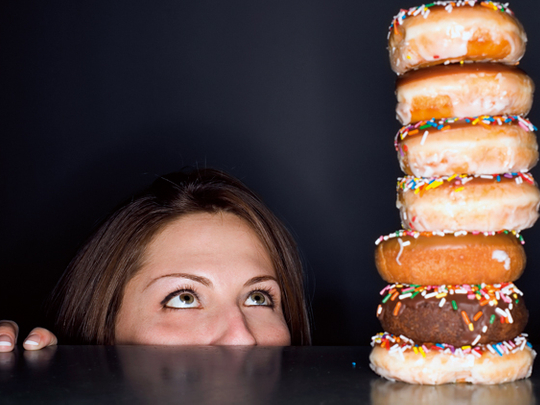
1. You set yourself an impossible target
Tell yourself you're going to lose seven kilos in a month and you're guaranteed to fail. That's because the only way to achieve that kind of dramatic weight loss is to starve yourself. And crash dieting can cause your metabolic rate to plunge by 10 per cent within 48 hours, because your body panics and goes into starvation mode, which makes it hold on to calories rather than burning them. You'll also be more tempted to binge and comfort-eat because of feeling as though you've ‘failed'.
Diet fix: You should aim to lose no more than a six kilos in six weeks. Every time you reach a goal, set another one. That way, you'll achieve sensible, sustainable weight loss.
2. You watch what you eat - down to the last calorie
"Calorie counters tend to eat more carbs, because carbs have fewer calories than proteins such as meat, fish, and cheese," explains nutritionist Zoë Harcombe (www.theharcombediet.com). "Calorie counters also tend to eat more processed or packaged foods, because these are the ones that have the calorie count on the label!
"Given that the body can't store fat without insulin and we only make insulin when we eat carbohydrates, you can see that carbs have a unique role to play in weight gain. Eating fewer calories, you will eat more carbs and this could be a key reason why your weight is not shifting."
Diet fix: Stop counting calories, and start focusing on the kind of food you're eating - so cut back on fatty, sugary, processed food and eat lean meat, fish and vegetables. Opt for food that has less than 5 per cent fat per 100g. And eat regularly - if you skip a meal, your body will think it's starving, and you'll end up eating too much at one sitting.
3. You're not getting enough sleep
Research has shown that sleep deprivation increases the appetite- stimulating hormone ghrelin, and decreases the appetite suppressing hormone leptin. So if you don't get enough quality shut-eye, you'll want to eat the wrong kinds of food to try to refuel your body.
Diet fix: Once you've ruled out any underlying causes of sleep disturbance, for example depression, you need to get into a routine that sets the scene for sleep. Make sure your bedroom is at a comfortable temperature (18-20°C), and it's dark and quiet - fit blackout blinds or curtains, or wear a sleep mask if you have to. Before going to bed, wind down with a warm relaxing bath, read, listen to soothing music (but don't watch TV).
"Don't have caffeine or heavy rich meals in the evening, and avoid processed food," adds Zoë. "Your tiredness will quickly disappear."
4. You're getting older
The body's muscle to fat ratio starts to decline from approximately 27 onwards, which is why we find it harder to lose weight as we get older. As our muscle content reduces, so our metabolic rate falls and we need less fuel (calories) on a daily basis.
Diet fix: "This is one of the easiest weight loss challenges to overcome - you just need to keep active and keep your lean tissue maintained," says Zoë. So whether you join a gym, swim or go running along the beach - get active!
5. You have too much on your mind
We have a row with our partner, we crave chocolate. We have problems at work or money worries, we want cake or crisps. Stress makes your body crave carbs and fat. "The natural human response to stress is to want ‘comfort food'," explains Zoë. "Stress causes hormonal changes in the body, including the release of cortisol and adrenalin, and both of these demand fuel so the body can respond with the fright/flight/fight mechanism. As the fuel is demanded, we want to eat - it's as simple as that. And, inevitably, we want instant fuel (simple sugars) rather than salmon and green vegetables."
Diet fix: Work out your stress triggers and try to avoid them, or at least learn how to deal with them. Write down how you're feeling, get a massage or curl up with a good book - whatever works for you. Learn to recognise stress cravings for what they are and satisfy them with a piece of fruit, instead of chocolate.
6. There is something wrong with your thyroid
If you really have been eating a sensible, balanced diet, and taking more exercise, and you still aren't losing weight, or if you have actually gained weight, you may have a thyroid condition. Hypothyroidism, or an under-active thyroid gland, is linked with weight gain as it slows down the metabolism.
Diet fix: Go to the doctor and get tested - weight gain due to thyroid issues requires proper treatment.
7. You are intolerant to a certain type of food
Food intolerance - unpleasant symptoms such as bloating or water retention as a result of eating certain food - develops when a person has too much of the same food too often. "If you are intolerant to a particular substance, you not only crave that substance, but you get physical symptoms, for example water retention," says Zoë. "So, if you feel bloated, puffy and find you have swollen fingers or ankles, you could well be intolerant to something you are eating too much of and too often." Food intolerances are becoming increasingly common due to modern lifestyles; gluten and lactose are the most common intolerances.
Diet fix: Book in for an intolerance test (different kinds of blood tests are offered at various clinics including the Dubai Herbal & Treatment Centre, www.dhtc.com) to investigate whether you have an intolerance. Or opt for the trial-and-error method by giving up the substance you suspect might be your intolerance trigger for up for five days (the time it takes to fully clear from your system) - if you shed some weight, then you've found your culprit!












